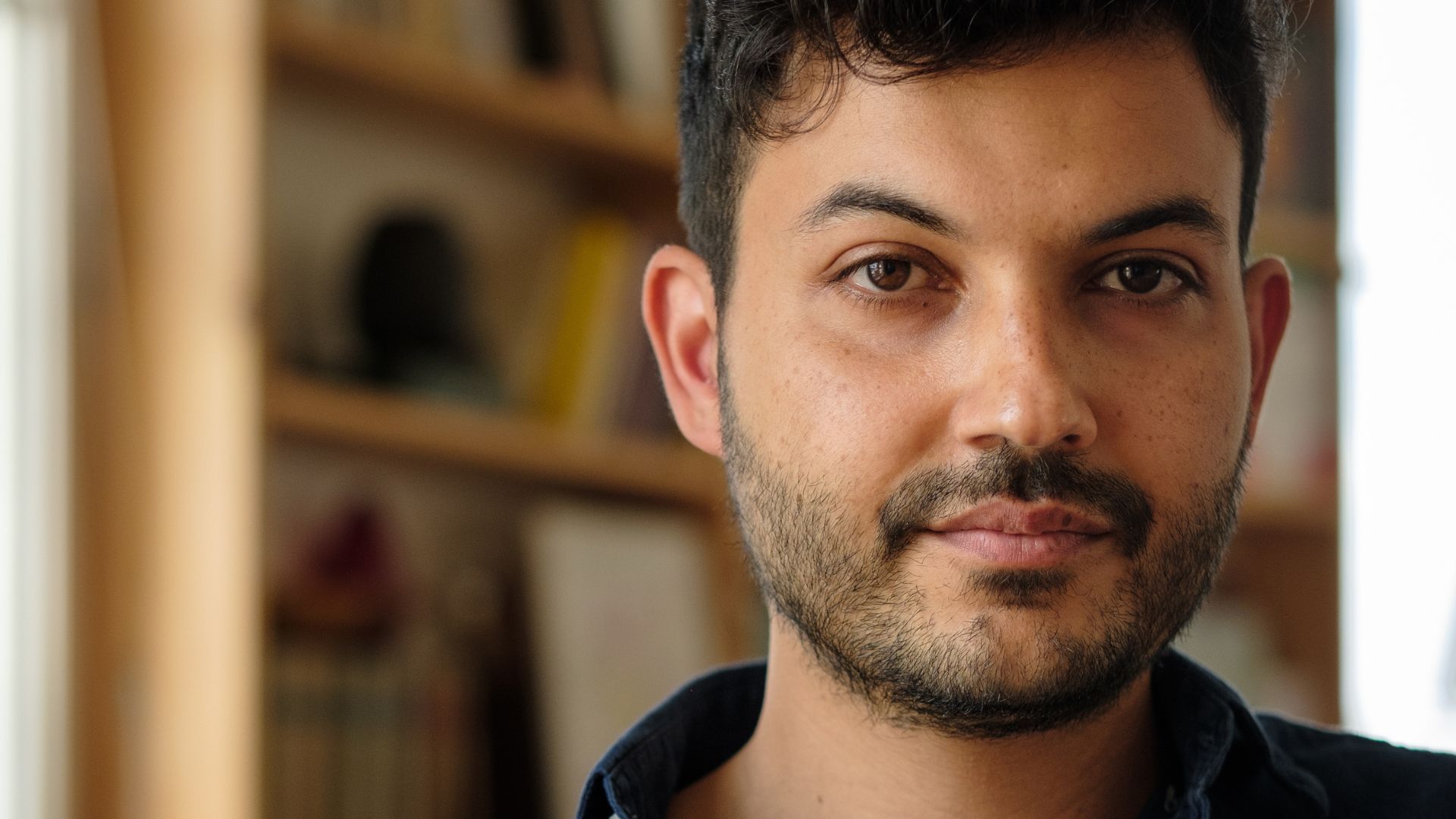You are viewing your 1 free article this month. Login to read more articles.
Débuts of 2024: Volume 1
Four first-time novelists discuss their fiction in our Débuts of 2024 selection.

New Titles Fiction Previewer
I compile the monthly New Titles: Fiction. A freelance critic and editor, I previously held ...more
 Madeleine Feeny
Madeleine FeenyNew Titles Fiction Previewer
I compile the monthly New Titles: Fiction. A freelance critic and editor, I previously held ...more
Glorious Exploits
Fig Tree, 18th January, £14.99, HB, 9780241617649
If you’ve been reading your mythology retellings, you might think you know your Ancient Greeks. Well, hold onto your laurel wreaths, because Ferdia Lennon’s exuberant début will take you on a wild ride into antiquity as you’ve never seen it before. Glorious Exploits is a tragicomic tale of artistic ambition rising from the ashes of war, bringing hope and friendship.
Like his hero, Hilary Mantel, Lennon approaches an historical turning point—the Athenian invasion of Sicily during the Peloponnesian War—from an unexpected angle, writing about Athens and theatre from an illiterate Syracusan potter’s perspective.
The Irish author is interested in “invisible history”—giving voice to the hoi polloi—because history is usually written by the élites. Yet his narrator, Lampo, a loveable beta male with a lot to learn, is scrabbling for purchase on the lower rungs of society, and sounds like someone you would have the craic with down the pub. “He’s like a Dublin character I knew well,” says Lennon.
The moment he wrote the first line in contemporary Irish vernacular, he had a character, a relationship, and the rest flowed. Lampo’s voice contains a metaphor, too: like Ireland, Sicily is an island, which had been colonised a few hundred years earlier, so it felt conceivable that, “like Hiberno-English, there would be a native dialect playing under the Greek”.
When the action starts in 412BC, Lampo’s home town of Syracuse has unexpectedly defeated Athens, the swaggering superpower whose invasion of Sicily would prove fatal to their 27-year campaign against arch-rival, Sparta. The whole saga is chronicled in Thucydides’ History of the Peloponnesian War, essentially “a Greek tragedy about the fall of Athens” which “knocked my socks off,” enthuses Lennon, a “classics nerd” since childhood.
The vanquished Athenians are being held captive in Syracusan quarries. Lampo’s best friend, Gelon, is “mad for” the Athenian tragedian Euripides, and the pair offer the starving prisoners sustenance in exchange for recitations from his plays. They then cast them in their own productions of “Medea” and “The Trojan Women”.
Amazingly, the idea is rooted in historical record; Plutarch’s Lives references how some Athenian prisoners survived by quoting Euripides to the poetry-loving Sicilians. For Lennon, this discovery transformed a large-scale war of conquest into a personal story, and he set out to investigate the contradiction between the dehumanisation of the prisoners and the obsession with their drama, and to imagine how that empathy gap might have been bridged.
To the modern reader, ancient Syracusan society is a mass of contradictions, “oddly relatable yet completely different”: a democracy in which only male citizens can vote, intellectually curious yet deeply religious, cultured yet militaristic. An undercurrent of loss thrums beneath the bustle, capturing that sense of “violence being quite close to the surface of the lived experience”.
Syracuse is battle-scarred, orphaned children running amok, and the novel contemplates the difficulty of forgiveness in the aftermath of war and the moral complexities of imprisonment. Although the book was begun long before, it’s tempting to draw parallels with Russia’s invasion of Ukraine. Like Russia, says Lennon, Athens never publicly stated that its aims were imperialistic.
Born in Dublin to an Irish mother and a Libyan father, Lennon believes Libya’s societal upheaval over the past decade partly motivated his desire to explore the fallout of war in fiction. While researching the novel, which includes a stark depiction of slavery in the ancient world, he was struck by disquieting echoes of modern Libya.
Having spent about seven years in Paris, Lennon now lives in Norwich with his family. He studied history and classics at University College Dublin, then graduated into the 2008 economic crash and taught English in Granada while making his first forays into writing. Later, he did an MA at UEA, taking Rebecca Stott’s “brilliant” historical fiction class alongside Imogen Hermes Gowar.
One perennial challenge is choosing what to omit from a mountain of research. To absorb the classical mentality, Lennon read extensively, intending to write about the Peloponnesian War. His eureka moment came when he decided that, like Homer’s “Iliad”, which chronicles the rage of Achilles rather than the whole Trojan War, he would focus on a short episode.
I’m surprised to hear Lennon doesn’t have much performing experience, so vividly does he evoke the unifying power of theatre. But he does compare writing fiction to method acting, and he certainly succeeds in getting under his characters’ skins. A “deeply flawed” narrator, Lampo’s “rogue’s confession” reveals his vulnerabilities, earning your affection and trust. His gags and missteps make you laugh, roll your eyes and ultimately root for him as he falls in love and learns to fight for what he wants.
As unpredictable, brutal and bittersweet as life itself, Glorious Exploits whisks you away on Lampo’s moral journey of self-discovery while celebrating art, forgiveness and fraternity.
Wild Houses
Jonathan Cape, 25th January, £16.99, HB, 9780224099851
Interviewed by Alice O’Keeffe
Nearly 10 years ago, Cape published a collection of short stories by a young Irish writer to extraordinary acclaim. Young Skins won the Guardian First Book Award, the Frank O’Connor International Short Story Award and the Rooney Prize for Irish Literature. A second collection, Homesickness, followed last year and now Colin Barrett’s long-awaited début novel arrives in January.
By turns raucously funny, tense and deeply affecting, it has been well worth the wait. Set in Ballina, a small town in Co Mayo in the west of Ireland, Wild Houses opens on a Friday night with small-time criminals Gabe, a heroin-ravaged 40-something, and his younger, slicker brother, Sketch, turning up at the remote farmhouse belonging to their cousin, Dev. With them is Donal, known as Doll, the teenage brother of local dealer Cillian English. Doll, it transpires, has been kidnapped by the Ferdia brothers in a sudden escalation of their feud with Cillian over a drug debt.
Over the course of the weekend, the consequences of this action will unfold at a cracking pace with a propulsive plot that draws in 17-year-old Nicky, who searches for her missing boyfriend, Doll, and Sheila English, Doll and Ciaran’s long-suffering mother. But, as Barrett explains over video call from his home in Dublin, the nail-biting plot—as it always does for him—grew out of the characters themselves. Wild Houses is really a study of two outsiders, and the story is told from their perspectives: the lumbering, reclusive Dev, caught up in his cousins’ wild revenge fantasy, and Nicky, seemingly self-contained and capable, as Barrett puts it: “Someone who you might mistake for a completely fine person.”
Wild Houses took Barrett “six or seven years” to write, on and off, while also working on the stories in Homesickness. “I thought it could become a novel because I had this sense that there was enough there. Even if [the characters] were dimly lit at the start, I knew they would come out and they would bring situations with them. But the only way to do that day to day is finding little details that I can build the characters up out of… All you can ever do is be vigilant for these little details that bring a character alive.”
In earlier drafts, Barrett experimented with telling the story from multiple points of view, including the English family, but later decided that the reader would “only ever see [the family] from the outside, it’s only ever Nicky or Dev observing Doll talking or Sheila talking”. There is one standout scene, pre-kidnapping, where Nicky gives Sheila a lift into town and they chat comfortably, aimlessly, while a playful, relaxed Doll interjects from the back seat. It is a single conversation, yet it encapsulates Doll and Sheila’s entire relationship. “Once I realised that that’s the way I was going to approach them, then I loved writing scenes like that because you can get so much in there without going into Sheila’s head or Doll’s head. It’s a bit of a challenge but, if you get it right, it really resonates with people.”
Growing up in Co Mayo (he was born in Alberta, Canada to Irish parents and moved back
to Ireland as a child) where people have a “very distinct way of speaking” is probably helpful to his writing, he acknowledges. “Dialogue is always telling you about a character even if they themselves are saying something quite incidental, they still reveal [so much], that’s the magic of it.”
While the chaos builds around them, Dev and Nicky must keep their heads. Of Nicky, who is calm on the surface but concealing a deep grief, Barrett says: “She’s the opposite of Dev in that he spends all his time in his head, and she is just trying to skim herself like a stone across the surface of her life. She wants to keep bouncing and not land, not stop.” Whereas Dev “is languishing, he’s buried in his past and his memories. Dev is in an extraordinary situation and his reaction is to mainly sit around and not talk. I think that’s a human reaction and I try to show his perspective as to why he acts like that”.
It is Barrett’s eye for detail, his close, meticulous attention to getting under the skin of his characters that has found him so many fans thus far, and Wild Houses will surely only build on that. “I always thought, well, even if I am a good writer, or a decent writer, who is really going to read Young Skins, this book of stories about this small town that I’ve made up and these people in it that I thought were very specific to my experience. But people read it, and they were like, ‘Oh, I know people exactly like that’. All over the world.”
Dominoes
Chatto & Windus, 7th March, £16.99, HB, 9781784744892
Interviewed by Katie Fraser
If a chorus of waiters brandishing a chocolate dessert singing “Happy birthday” is not a fortuitous sign of a wonderful conversation, I don’t know what it is. When I meet début novelist and actor Phoebe McIntosh at a café in King’s Cross on her birthday, she blows out the candle, contemplating her wish in a moment of stillness before we talk about her thought-provoking and electric début, Dominoes.
The impending marriage of Layla and Andy is under threat. Their whirlwind romance, forged during the Covid-19 pandemic, is intoxicating and relatable, peppered with the normal anxieties any new and then established relationships endure, but there is one more worry Layla must contend with. Layla and Andy share a surname—McKinnon—and what is initially thought to be a cute quirk which foretold their coupling up, in fact alludes to a darker truth about their respective family histories. When this truth is revealed Layla spirals and, as the wedding day nears, her genealogical quest becomes increasingly urgent as she grapples not only with whether she should marry Andy, but also with the history of their two families. “It’s very much a story of now and how we deal with legacies,” explains McIntosh.
Dominoes originally began as a one-woman stage show written and performed by McIntosh to have “something I could be cast in and that no one could say: ‘You’re not right for’”. In an online magazine article explaining why she penned the show, McIntosh stated: “I wrote ‘Dominoes’ when I’d started having concerns that perhaps my fair skin and blond curls, my half-Jamaican, half-English heritage—the things I’m told make me unique and interesting—were also making me too difficult for casting directors to cast and for agents to sign.” The positive audience response to the sell-out run at the 2013 Edinburgh Fringe Festival which was followed by winning a place on the Tamasha x Hachette Creative Writing Programme helped solidify McIntosh’s belief that “Dominoes” the show could become a novel.
What is remarkable about Dominoes is how it elegantly situates geo-political questions concerning the legacy of colonialism in Britain within preparations for a marriage. At its heart, the novel is a love story, but the romance is a catalyst for larger, messier questions of identity. “I tried to get into the zone of what a momentous change marriage can be and the fact that it can leave someone ripe for questioning themselves and asking—‘What am I? What do I want from this marriage?’ Those questions couldn’t be answered without [Layla] going down the rabbit hole of ‘who am I and what am I bringing to this relationship in terms of my family lineage’.”
A documentary titled “Britain’s Forgotten Slave Owners” was both inspiration for the novel and is included in the story when Layla learns the truth about her shared surname. Presented by historian David Olusoga, the programme explains how the British government paid what would now be the equivalent of £17bn to compensate slave owners for their “loss of property” in the wake of Abolition. This money “sank like seeds into the soil of the British Isles”, McIntosh writes, and provided the wealth from which Andy’s family continue to benefit.
The novel settles itself into the nooks and crannies of London, but also visits Birmingham and Jamaica as we meet Layla’s contemplative, rambunctious grandfather and her family in the Caribbean. Playing dominoes is a Jamaican past-time, McIntosh tells me, and the novel’s title is inspired both by this and McIntosh’s own grandfather. “My grandad had his favourite dominoes and the white spots [were] rubbing off because we played with them so many times or he’d glued them back together [because he] slammed them down so hard,” she explains, laughing.
Alongside the discovery of her ancestry, Layla must also come to terms with the estrangement of her childhood best friend Sera who perceives Layla’s engagement as a betrayal of her Black heritage. The dissolution of this relationship is, for McIntosh, one of the “most heart-breaking things about the book”. “We’re led to believe that a friendship should be an enduring thing,” reflects McIntosh. “I wanted to explore whether people can reach adulthood as friends and then be influenced by different politics and different relationships, but still have that same level of connection.”
It is testament to McIntosh’s skill that she distils seismic personal and historical questions with quieter contemplations on self-acceptance into a propulsive plot and, although purposefully offering no simple answers, pushes the reader toward a reconciliatory vision of the future. “I like that this is the message: go and do the work and get to know yourself and who you’re telling people you are, what you stand for, what you represent and what makes you whole and then go forth in that knowledge with kindness and respect.”
The Ministry of Time
Sceptre, 16th May, £16.99, HB, 9781399726344
Interviewed by Alice O’Keeffe
Back in April 2021, when lockdown made telly addicts of us all, Kaliane Bradley started watching “The Terror”, a fictionalised retelling of Sir John Franklin’s 1845 expedition to the Arctic to find the fabled North-West Passage, based on the book by Dan Simmons. It wasn’t long before Bradley was completely hooked, reading every book she could find on the subject. Online, she found a welcoming, like-minded community who were “really into Polar exploration in general”, she tells me, over a pot of tea in an east London café.
They would share their thoughts on the individual explorers, some hugely famous and others relatively unknown, and one day Bradley admitted to the group: “By the way, my favourite is this guy that no-one cares about, Graham Gore, he’s not in any books, he’s not really in the archives, but I love him.”
It was a strange time, she acknowledges, so “just reading about this incredibly charismatic, quite stoic, pleasant-tempered man, who’d gone through these immense upheavals—I thought, God, I bet he’d be nice to have around in a pandemic”. So, initially to entertain these online friends, she started writing the first version of what would become The Ministry of Time. It began, she says, as “sort of a joke—what would it be like if your favourite Polar explorer lived with you as a housemate?”
The Ministry of Time is Sceptre’s superlead début for 2024, acquired in a 48-hour pre-empt. It has sold in 19 territories to date, and TV and film rights were optioned after a 21-way auction. The novel opens with the unnamed female civil servant narrator interviewing for a new job and learning that the British government has developed the means to travel through time. She will work as a “bridge”, a liaison and housemate, for an “expat” rescued from history: Commander Graham Gore (RN circa 1809-circa 1847). Four other expats (all fictional) are also brought into the 21st century.
The “bridge” and Graham Gore move into a safehouse somewhere in London, where she begins the delicate process of assimilation, bringing him up to speed with developments since the Victorian age. Bradley, whose “all-time favourite writer” is Terry Pratchett, mines a rich source of comedy with this fish-out-of-water side to the charming, chain-smoking Gore. The “bridge” maintains a professional distance to begin with, but the sexual tension between the two builds slowly and inexorably.
The Ministry of Time plays with genre, careering from time-travel to comedy to love story and
what Bradley calls “the spy thriller elements” along with a darker undercurrent, and a clever twist. No spoilers here, but Bradley says, “when I was thinking about the Ministry I was thinking about the legacy of the British Empire”.
The online friends, for whom she was writing the original story in serial form-—“I’d write a chapter and they would read it and respond”—suggested she send it to a literary agent. I ask if she was tempted to break cover at that point, because Bradley is, of course, also a commissioning editor, now at Penguin Press, formerly at Granta. Alongside this editorial career she was also writing short stories. In 2022 she won two notable short story awards, the Harper’s Bazaar Short Story Prize and the V S Pritchett Short Story Prize.
But when it came to finding representation for The Ministry of Time, she submitted to agents under a pseudonym. “I didn’t want people who I knew, or were my friends, to feel like they had to read it… ‘Oh my God, she wants me to read her novel, what do I do? What if I hate it?’ I also didn’t want a situation where they felt awkward turning it down, I wanted it to be simple”.
Two agents showed a keen interest in the pseudonymous novel, along with Chris Wellbelove at Alexander Aitken Associates: “He first approached me seven years ago after he read a short story of mine, and said, are you working on a novel? And he has been supportive for many, many years and consistently checked in with me to find out how things are going. He’s seen bad drafts of earlier novels [Ministry is her fourth completed novel] which we never talk about!”
Bradley has no plans to give up the publishing day job, preferring to write in the evenings after work.
“I mean, I’ve never not had a day job but I found it helpful to have that structure. One book does not a writing career make…so I think it’s very unwise to bank on this idea of becoming a career writer because that’s not something that is afforded to most writers.”
Before Penguin Press and Granta, Bradley worked as a bookseller at Waterstones Gower Street for two years. So how would she describe her début novel to a room full of booksellers? Ever the editor, she has the perfect one-line pitch: “It’s a time travel romance about Empire, bureaucracy and cigarettes.”








